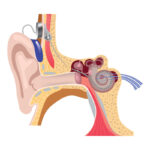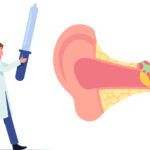Exploring the Relationship Between Tinnitus and Depression: Causes, Consequences, and Coping Strategies
Tinnitus, a widespread hearing condition that affects people worldwide, is often misunderstood and misdiagnosed. It is characterized by the perception of continuous noise, ringing, or buzzing in one or both ears, which can significantly impact one's daily life, including sleep, concentration, and mood.
Tinnitus can be caused by various factors such as exposure to loud noises, ear infections, aging, and underlying medical conditions, making it a complex and multifaceted condition. The relationship between tinnitus and depression is intricate, with both conditions influencing each other.
People with tinnitus are more likely to experience depression and anxiety due to the constant noise and disruption to their daily life, while those with depression may be more susceptible to developing tinnitus due to the impact of depression on the brain and body.
Coping with tinnitus and depression can be challenging, but there are various strategies available, such as mindfulness, cognitive-behavioral therapy, sound therapy, and medication, that can help alleviate symptoms and improve quality of life. In this comprehensive guide, we'll delve deeper into the causes, consequences, and coping strategies for tinnitus and depression, providing you with valuable insight and knowledge on this important issue.
Understanding Tinnitus: Causes, Symptoms, and Prevalence

Tinnitus is characterized by the perception of sound when there is no external source present. These phantom sounds can vary in pitch and volume and may be continuous or intermittent. Tinnitus is a symptom rather than a disease, and its underlying causes can be diverse, including:
- Exposure to loud noise
- Aging-related hearing loss
- Ear infections or blockages
- Ototoxic medications
- Traumatic brain injury
- Meniere's disease
According to the American Tinnitus Association, approximately 50 million people in the United States experience some form of tinnitus. For some, it is a mild annoyance, but for others, it can be a severe and debilitating condition.
The Connection Between Tinnitus and Depression
Numerous studies have shown a strong correlation between tinnitus and depression. The persistent noise experienced by tinnitus sufferers can lead to:
- Sleep disturbances
- Difficulties in concentrating
- Emotional distress
- Social isolation
- Decreased work or school performance
These factors can contribute to the development of depression, a mental health disorder characterized by persistent feelings of sadness, hopelessness, and a lack of interest in activities once enjoyed.
Conversely, depression can exacerbate tinnitus symptoms by increasing sensitivity to the phantom sounds and reducing the ability to cope with the condition. As a result, a vicious cycle can emerge, where the presence of one condition aggravates the other.
The Impact of Tinnitus on Mental Health

Tinnitus is a condition characterized by ringing, buzzing, or other noises in the ears that can affect people of all ages and backgrounds. The impact of tinnitus on mental health can vary from person to person, but it is often reported to be a major source of stress and anxiety.
The symptoms of tinnitus can be debilitating and have a significant impact on a person's quality of life, which can lead to feelings of hopelessness and despair. Moreover, the chronic nature of tinnitus means that sufferers may experience these negative emotions for extended periods of time, further exacerbating their mental health issues.
Furthermore, tinnitus can also affect a person's cognitive functioning, leading to difficulty with concentration, memory, and other mental processes. These cognitive impairments can affect a person's ability to perform daily tasks and can contribute to the development of depression and anxiety.
In addition, the impact of tinnitus on sleep patterns can also contribute to the development of mental health issues. Many people with tinnitus report difficulty falling or staying asleep, which can result in fatigue, irritability, and other negative emotions.
Tinnitus sufferers may also experience social isolation, as the condition can make it difficult to participate in social activities and maintain relationships with friends and family. This social isolation can lead to feelings of loneliness and depression, which can further exacerbate the negative impact of tinnitus on mental health.
Coping Strategies for Managing Tinnitus and Depression
Effectively managing tinnitus and depression requires a combination of self-help strategies and professional support. Some approaches to consider include:
- Sound therapy: Utilizing background noise or sound machines to mask the tinnitus can provide relief and improve concentration.
- Relaxation techniques: Practices such as deep breathing, progressive muscle relaxation, and meditation can help alleviate stress and anxiety associated with tinnitus.
- Cognitive-behavioral therapy (CBT): This form of therapy can help change negative thought patterns and behaviors related to tinnitus and depression.
- Support groups: Joining a support group can provide a sense of community and understanding for individuals dealing with tinnitus and depression.
- Physical activity: Regular exercise has been shown to improve mood and reduce symptoms of depression.
Seeking Professional Help
While self-help strategies can be effective in managing tinnitus and depression, it is essential to seek professional help when necessary. A comprehensive evaluation by a healthcare professional, such as an audiologist, psychologist, or psychiatrist, can help determine the best course of action for your specific situation. Treatment options may include:
- Medication: Antidepressants or anti-anxiety medications may be prescribed to help manage depression or anxiety associated with tinnitus.
- Tinnitus retraining therapy (TRT): This therapy combines sound therapy and counseling to help individuals habituate to their tinnitus and reduce the negative emotional impact.
- Hearing aids: For those with hearing loss in addition to tinnitus, hearing aids can help improve communication and reduce the perception of tinnitus by amplifying external sounds.
- Counseling: Individual or group counseling can provide support and coping strategies for managing tinnitus and depression.
Conclusion
The relationship between tinnitus and depression is complex and multifaceted, with both conditions having the potential to exacerbate one another. By understanding the causes, consequences, and coping strategies associated with tinnitus and depression, individuals can take control of their symptoms and improve their overall quality of life. Seeking professional help when necessary, combined with self-help techniques, can provide the support needed to navigate this challenging journey.
Sources
- American Tinnitus Association. (n.d.). Understanding the Facts. Retrieved from https://www.ata.org/understanding-facts
- Fagelson, M. A. (2007). The association between tinnitus and posttraumatic stress disorder. American Journal of Audiology, 16(2), 107-117. https://pubs.asha.org/doi/10.1044/1059-0889(2007/012)
- Tyler, R. S., & Baker, L. J. (1983). Difficulties experienced by tinnitus sufferers. Journal of Speech and Hearing Disorders, 48(2), 150-154. https://pubs.asha.org/doi/10.1044/jshd.4802.150







